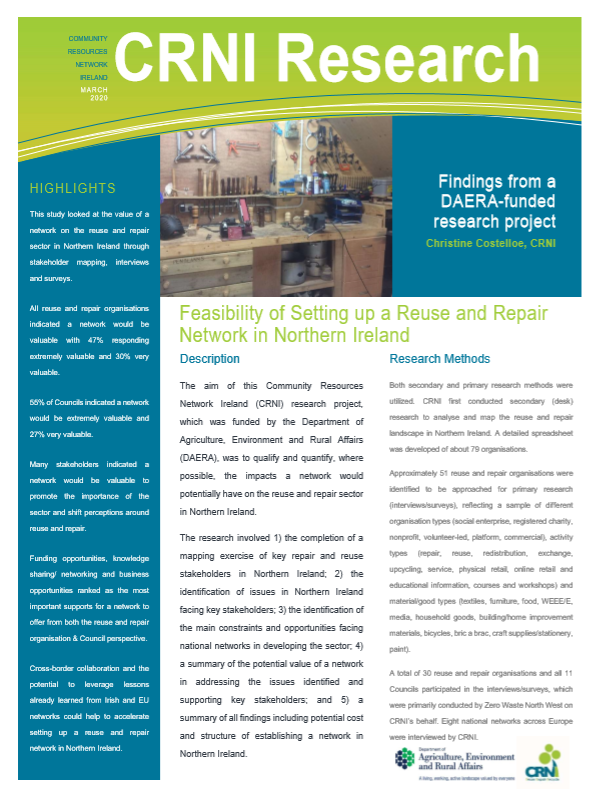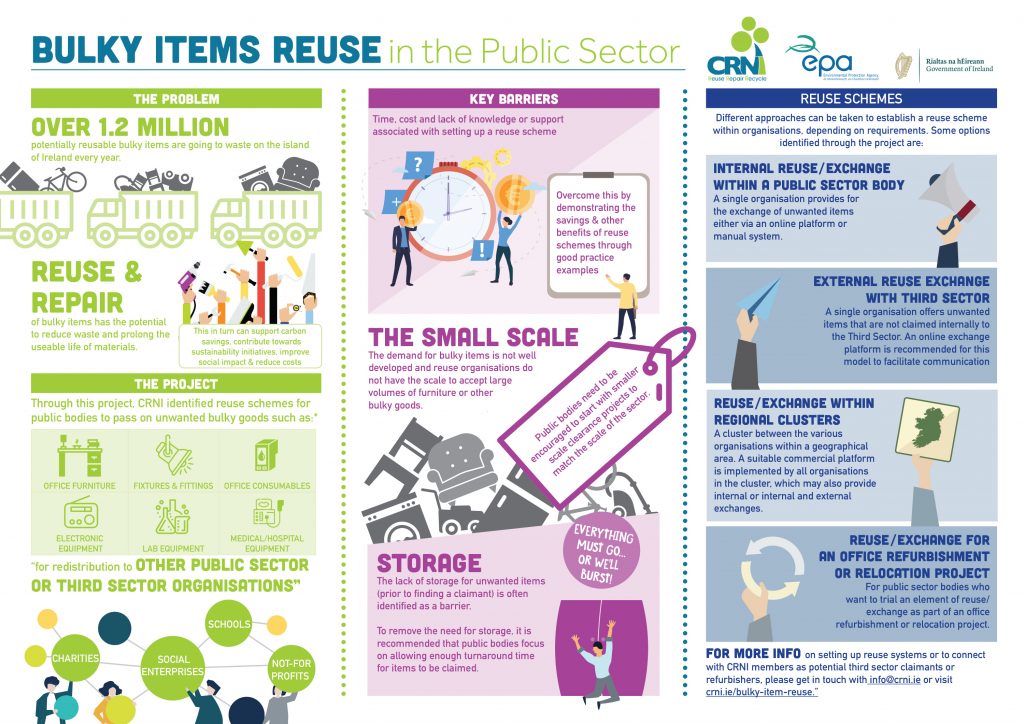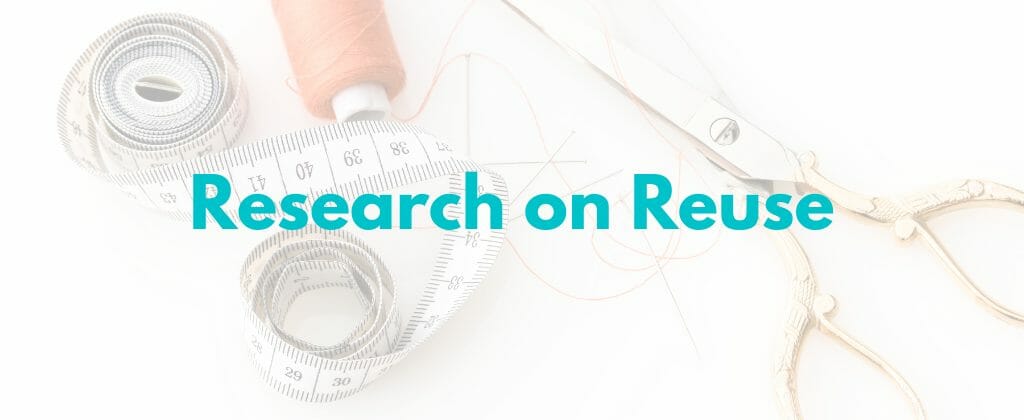
Research on Reuse
To further develop CRNI as an authority on reuse and green job creation, CRNI and its members regularly engage in or inform research projects.
Many of these projects are funded through the EPA’s Green Enterprise programme, which aims to ensure that cleaner greener production, re-use and ecoefficiency become the established norm in Ireland. For more information on this programme, please visit the EPA website.
Systems supporting Material Reuse
Feasibility of Setting up a Reuse and Repair Network in Northern Ireland
The aim of this research project funded by the Department of Agriculture, Environment and Rural Affairs (DAERA) was to qualify and quantify, where possible, the impacts a network would potentially have on the reuse and repair sector in Northern Ireland.
A total of 30 reuse and repair organisations and all 11 Councils in participated in the interviews/surveys. Eight national networks across Europe also participated.
Published March 2020.
Bulky Item Reuse
Through this Green Enterprise funded project, CRNI aimed to design value propositions and a viable business model to encourage Public Service Bodies (and eventually other private organisations) to donate unwanted bulky items for reuse or community recycling, where reuse is not possible.
The key findings are
– rather than developing one national platform, four different models were identified depending to adapt to the circumstances.
– A strong policy driver is required to provide Public Service Bodies with the incentive to adopt reuse/exchange activities.
Completed Jan 2020
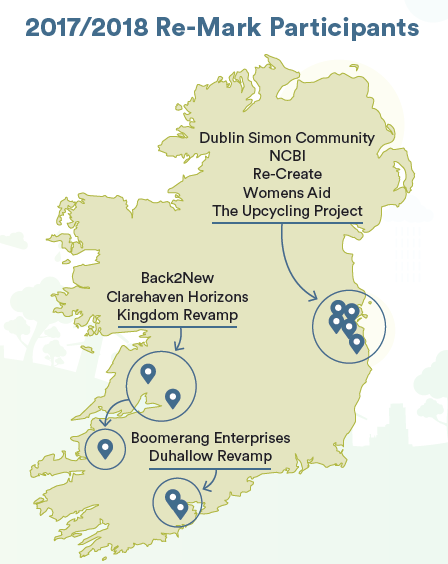
Re-Mark, Ireland's Quality Mark of Excellence
ReMark, Ireland’s Reuse Quality Mark of Excellence was established to address consumer concerns regarding the quality and safety of reused goods. It is an organisational level accreditation process for the reuse sector. The quality mark and pilot were established through EPA Green Enterprise funding. More information on our project page here.
Completed March 2019.
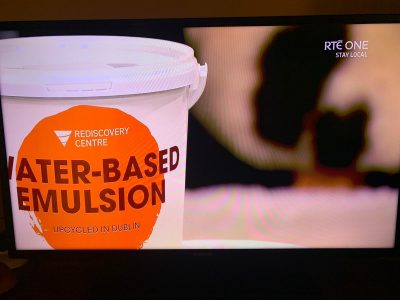
Rediscover Paint – Investigating methods for the expansion of paint reuse in Ireland
Building on the success of Rediscover Paint, a reuse project in Ballymun, this report reviews the opportunity for paint reuse and waste prevention in Ireland. The findings of this report are relevant to social enterprise organisations and groups interested in the reuse
of surplus and leftover paint and those focussed on effective resource management and best practice reuse in support of the circular economy.
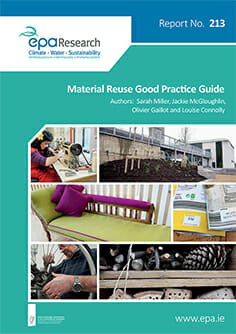
Material Reuse Good Practice Guide
The Rediscovery Centre developed best practice guidelines on reuse through EPA funded research, available here. The research, titled “Development of a Material Reuse Protocol”, created guidelines on the reuse of furniture, bicycles, textiles and post manufacturing food. Reuse good practice demonstration is important for the reuse and charity sector, and the wider green sector, both locally and in helping Ireland to meet EU targets.
May 2017
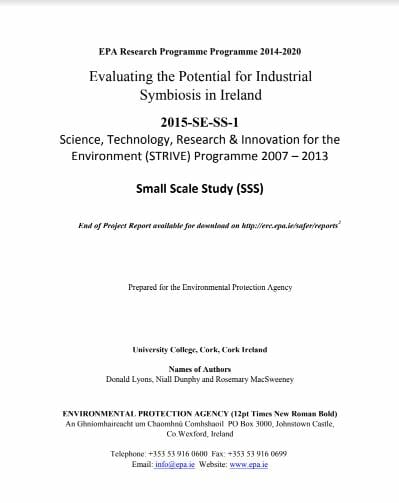
Evaluating the Potential for Industrial Symbiosis in Ireland
This study published by UCC on behalf of the EPA, sought to identify if Industrial Symbiosis exchanges were occurring and if such exchanges could be identified through analysis on data on specific waste streams and companies in Ireland. In conclusion, it found that the most significant incentives for Industrial Symbiosis in Ireland relate to cost. It confirms there is potential to vastly expand the practices of Industrial Symbiosis to additional industries.
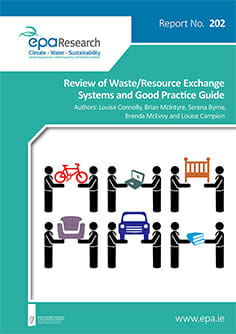
Review of Waste Resource Exchange Systems and Good Practice Guide
This research, available here, completed through the Green Enterprise programme provides a good practice guide to demonstrate how new and existing organisations can be set up and operate to the highest standards. Factsheets are also included targeting those engaging with waste resource exchange systems to ensure that their interactions are informed and conducted in line with industry good practice.
Electrical and Electronic Equipment Reuse
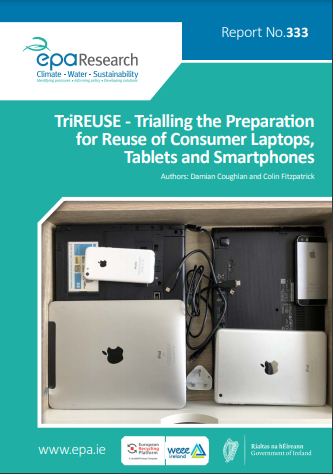
TriREUSE - Trialling the Preparation for Reuse of Consumer Laptops, Tablets and Smartphones
The TriREUSE project aimed
to provide an insight into possible reuse rates for WEEE collections that specifically target consumer
ICT products with reuse potential. It also examined how such promotional events could operate in practice and aimed to provide some conclusions and recommendations based on what was learned from the process.
August 2020
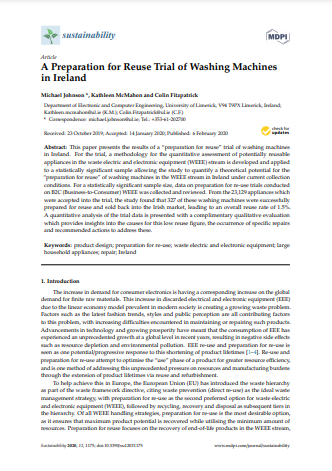
A Preparation for Reuse Trial of Washing Machines in Ireland
This paper presents the results of a “preparation for reuse” trial of washing machines in Ireland. A quantitative analysis of the trial data is presented with a complimentary qualitative evaluation which provides insights into the causes for this low reuse figure, the occurrence of specific repairs and recommended actions to address these.
Feb 2020
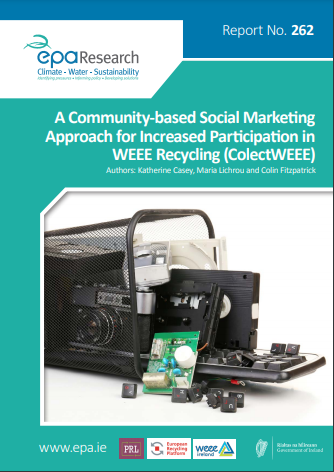
A Community-based Social Marketing Approach for Increased Participation in WEEE Recycling (ColectWEEE)
This study explored human behaviour in relation to small WEEE recycling. In doing so, the research took a quasi-ethnographic approach to investigate WEEE disposal behaviours from an “emic” perspective, i.e., consumer experiences and interpretations of WEEE and its disposal as these are situated within the context of consumers’ everyday lives.
Nov 2018
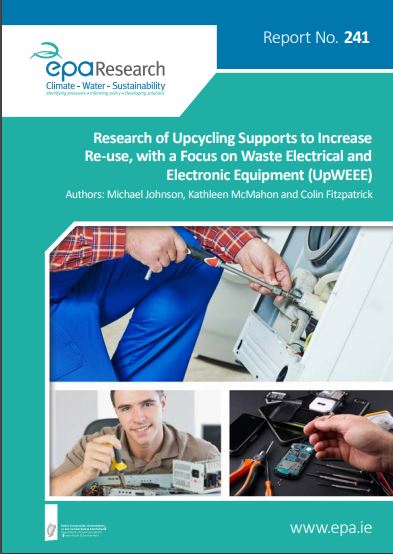
Research of Upcycling Supports to Increase Re-use, with a Focus on Waste Electrical and Electronic Equipment (UpWEEE)
This report provides a range of recommendations aimed at supporting preparation for re-use of waste electrical and electronic equipment (WEEE) that will support the extension and development of this activity in Ireland. One key recommendation is to introduce preparation for re-use target for producers and producer responsibility organisations to stimulate change in the current system.
March 2018
Behaviour
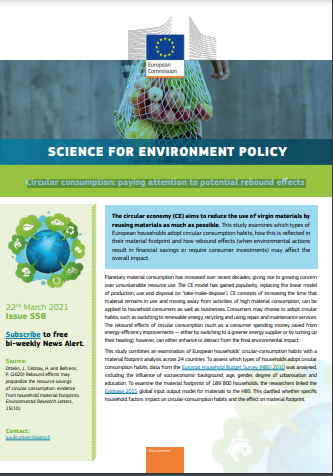
Circular consumption: paying attention to potential rebound effects
The circular economy (CE) aims to reduce the use of virgin materials by reusing materials as much as possible. This study examines which types of European households adopt circular consumption habits, how this is reflected in their material footprint and how rebound effects (when environmental actions result in financial savings or require consumer investments) may affect the overall impact. For more see here
Measurement & Metrics
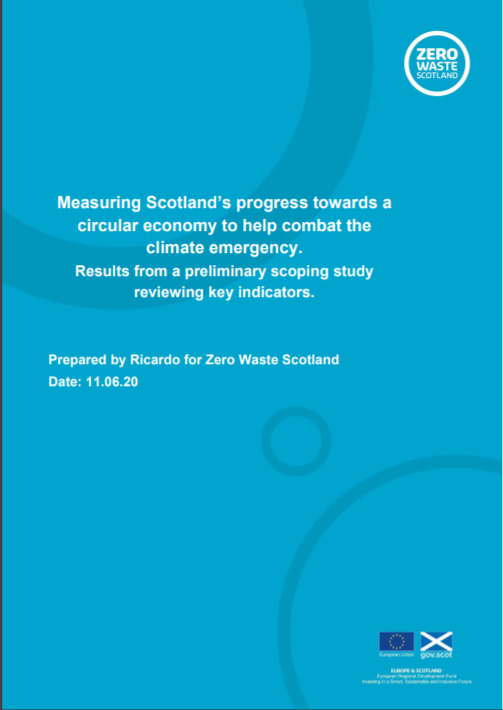
Measuring Scotland’s progress towards a circular economy to help combat the climate emergency
Zero Waste Scotland commissioned this study to assess the value of existing metrics and identify the most effective ways to drive and track progress on reducing our carbon emissions. The study found that for a true measure of the carbon impact of our consumption habits, we need to measure the emissions created across the whole supply chain, from extraction of raw materials through transportation, manufacturing, use and reuse, to disposal at end-of-life. For more see here
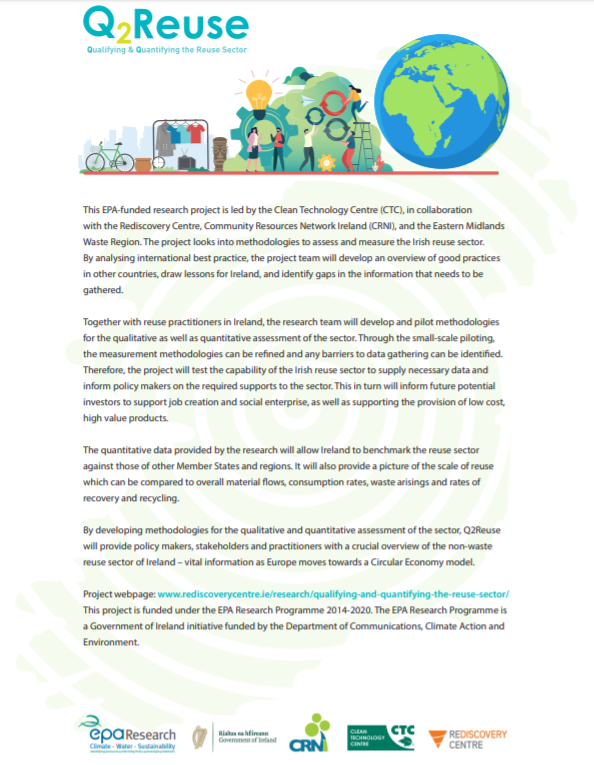
Qualification and Quantification of Reuse in Ireland
This research project currently underway (end date January 2021) is led by the Clean Technology Centre (CTC) in collaboration with the Rediscovery Centre, CRNI and the Eastern Midlands Waste Region. By developing methodologies for the qualitative and quantitative assessment of the sector, it will provide policy makers, stakeholders and practitioners with a crucial overview of the non-waste reuse sector of Ireland – vital information as Europe moves towards a Circular Economy model. For more see here
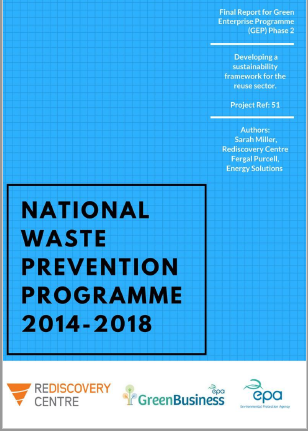
Key Performance Indicators for the Reuse sector
The Rediscovery Centre conducted this study, available here, under the EPA’s Green Enterprise progamme to identify key social, economic and environmental indicators appropriate for measuring the impact of the reuse sector in Ireland. The study demonstrates the importance of sustainability monitoring for communicating impact and presents a methodology for the process.

Quantifying the monetary value of reuse
FreeTrade Ireland with the EPA has published this report to quantify the total savings realised through reuse via the online exchange. This measure takes into account the value of equivalent items available for purchase including other second hand items. For 2015 the estimated savings from reuse via FreeTrade were €660,234.
Demonstration and Creative Reuse
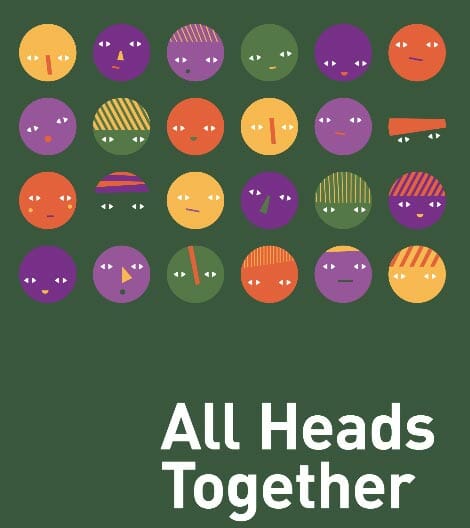
All Heads Together
Published by ReCreate with Trinity College this handbook provides insights and practical guidance to teaching artists and teachers working with reuse materials in inclusive educational settings. Information on a shared delivery model and inclusive practices, lesson planning, assessing progress, classroom and behaviour management, legal and policy compliance, and a series of sample lesson plans are included.
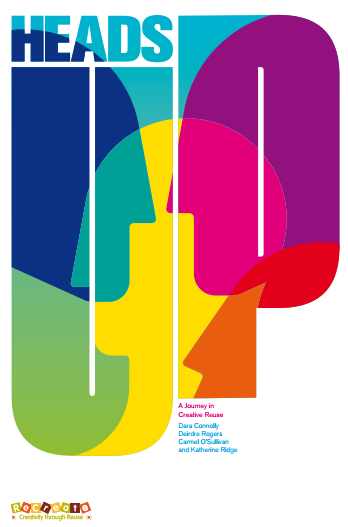
Head's Up
ReCreate’s Head’s Up project involved an artist-in-residence model that saw 18 educational and community groups undertake a prolonged exploration with a professional artist through the medium of reuse materials. The emphasis for these workshops was to demonstrate the benefits of arts practices through creative reuse in fully inclusive settings. The report, available here, explores the benefits of arts-based approaches in such educational settings in progressing the learner’s cognitive, socio-emotional, physical, motor and linguistic abilities.
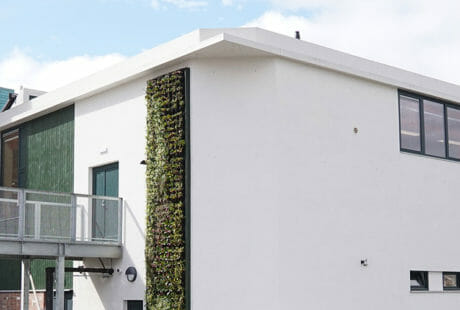
WISER Life Project
In May 2017 the Rediscovery centre launched its flagship national reuse centre at Ballymun’s old Boiler House, the outcome of a €3.6M EU Life+ environment project. WISER (Working with Industrial Spaces to Exemplify Reuse) Life is a prototype “3D textbook” which will promote positive behavioural change with regard to resource management and efficiency. WISER Life presents a new concept in educational space highlighting the ability to incorporate active learning through building design, construction, operation and occupation thereby defining the building as an educational tool. For a brief overview of this project see the WISER Life website.
Sign up to our quarterly newsletter for more information on reuse and recycling and be part of Ireland’s only reuse and recycling network. For information about our privacy practices, see here.
Our funders
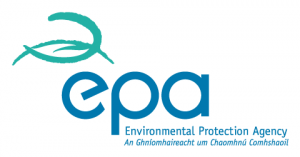
EPA Circular Economy Programme
CRNI supports its members and works to mainstream reuse thanks to core funding provided by the EPA under the Circular Economy Programme.
For more information about the programme see here.
Project Funding

Green + Social Virtual Trade Fair
CRNI’s Green + Social Virtual Trade Fair is funded by Ireland’s Regional Waste Management Plan Offices. This innovative virtual platform is open 24/7 and gives visitors the opportunity to explore green and social procurement opportunities provided by reuse, repair and recycling social enterprises and community-based organisations across Ireland.
Access the Green + Social Virtual Trade Fair here.
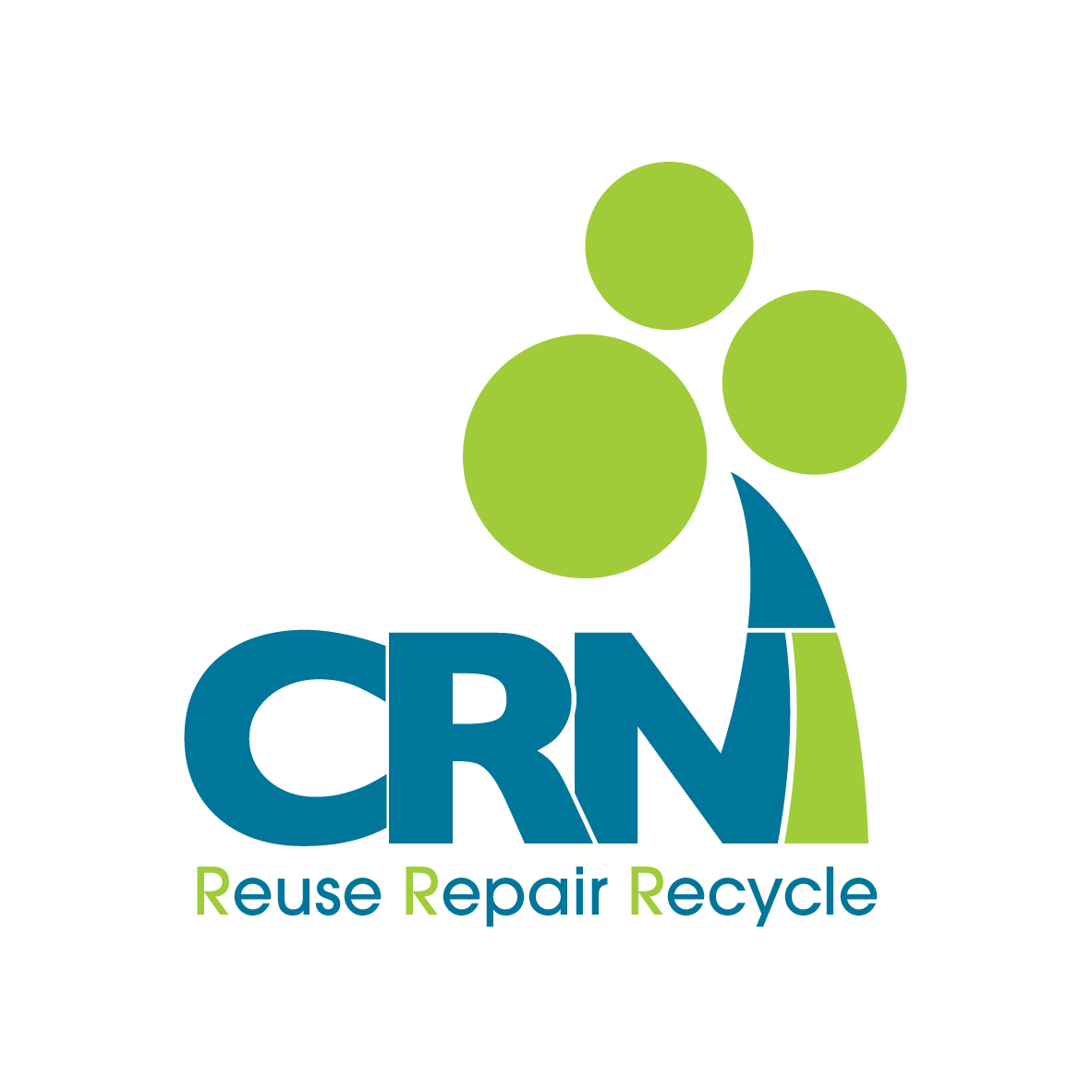
CRNI is the all island representative body for community based reuse, recycling and waste prevention organisations. We are funded by the EPA under the National Waste Prevention Programme and through membership contributions. CRNI is a proud member of the European RREUSE network.
Company Limited by Guarantee. Registered in Ireland No. 493039
Registered Charity No. 20077259
CHY No.19637
Latest Posts
- We’re hiring! Executive Director & Network Manager April 9, 2024
- Gift an experience or shop preloved while supporting community causes with CRNI members December 5, 2023
- 5 Ways to Give to CRNI Members this Giving Tuesday November 28, 2023
- It’s Second Hand September! September 5, 2023
Useful links
Contact Us
Community Resources Network CLG
Registered office:
The Tara Building11-15 Tara Street
Dublin 2
D02 RY83
Phone: +353 87 173 5184
Email: [email protected]
© Community Resources Network Ireland. All Rights Reserved.
